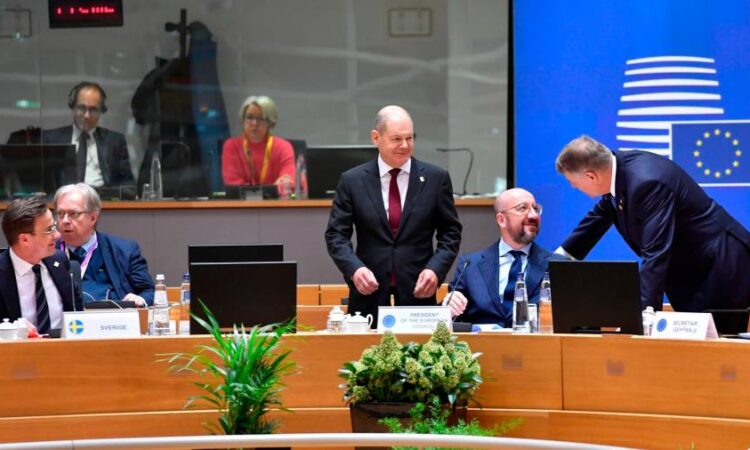
The EU remains deadlocked over whether to recognise nuclear power as equal to renewable energy, as France and Germany sparred over new allies at a summit on Friday.
French president Emmanuel Macron, whose government has led a push for more favourable treatment of nuclear energy, discussed the handling of the fuel with German chancellor Olaf Scholz at a breakfast meeting on Friday as the two sides clash over the treatment of the fuel.
Following the meeting, the French president told journalists that he was hopeful of finding an agreement with Germany, which is one of several countries opposing French efforts to have nuclear recognised in multiple legislative files related to the green transition.
“I think we’ll find an agreement, we’re in the process of finding one on hydrogen and on other topics in order to preserve technological neutrality,” Macron said.
The recognition of nuclear power as a low-carbon energy source is a key fight for France as it tries to ensure more funding can be directed towards its existing nuclear fleet. Almost half of its 56 reactors had to be closed last year for extensive maintenance work to mend cracks. Nuclear power plants generated close to 70 per cent of France’s electricity in 2021.
Ursula von der Leyen, European Commission president, said on the first day of a two-day EU leaders’ summit in Brussels on Thursday, that nuclear could “play a role” in Europe’s decarbonising effort, adding that only “cutting edge” nuclear technology might get access to simplified rules and incentives in the EU’s recently launched draft net zero Industry Act and that it would not be eligible for all the benefits of the legislation.
The kind of technology she was referring to are the small modular reactors that are under development in several countries including France.

Germany is similarly cautious. It is not opposed to the use of nuclear in the production of hydrogen — which was the topic of a joint declaration with French ministers on January 22 — but Berlin is not willing to treat nuclear energy as equivalent to renewables such as wind or solar, which would give it privileged access to EU funding.
Belgian’s prime minister Alexander De Croo told the Financial Times that countries should take a “pragmatic” approach, but Austria and Luxembourg are ideologically opposed to nuclear power and are suing the commission for giving nuclear power a “green” label in its framework for sustainable investments.
In France’s camp, Polish prime minister Mateusz Morawiecki told the FT that nuclear power should be eligible for EU financing.
Nuclear energy “absolutely should be given the same status [as solar and wind power] because we do not have technology to store energy from renewables”, he said.
Warsaw last year discussed partnering with the US and France to develop nuclear power in Poland in line with its plans to commission its first nuclear plant in 2033.
He slammed the EU’s efforts to decarbonise its economy, however, saying that the bloc should slow down its efforts to reach net zero emissions in line with countries such as Russia and China.
“Europe’s emissions of CO₂ is approximately 8 per cent of the entire globe. And if we reduce it by 1 per cent with huge effort, and there is a carbon leakage and lots of jobs lost from Europe. And at the same time, in India and China and in Russia, new coal power plants are being opened . . . It’s not making huge sense.”
The EU has set itself a target of reaching net zero emissions by 2050, while both Russia and China have committed to reaching the same goal 10 years later.
A senior German official said this week that the Franco-German joint declaration in January, while acknowledging the role of low carbon sources of energy such as nuclear, stressed how important it was to “safeguard . . . the overall ambition level of the renewable target”.
“In other words, if we were to make nuclear energy equivalent to renewables, we’d reduce the ambition level of renewables,” he said. Nuclear could, he said, contribute to decarbonisation efforts, “but it’s just not a source of renewable energy. And France signed up to that.”
Additional reporting by Andy Bounds in Brussels, Leila Abboud in Paris






